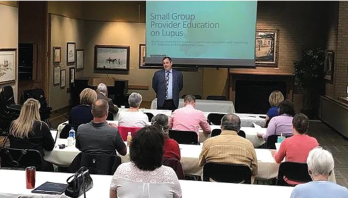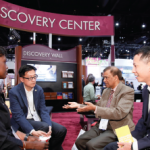
Two of the ACR’s Collaborative Initiatives (COIN) programs share a goal: to educate non-rheumatologist providers about systemic lupus erythematosus (SLE) symptoms to facilitate referrals, accurate diagnosis and therapy.
Small Group Provider Sessions
Launched in 2016, Small Group Provider Sessions provide lupus education while connecting frontline providers to a local rheumatologist in often underserved areas. The rheumatologist leads these two-hour sessions for 10 to 20 providers. They cover lupus risk, symptoms, diagnosis and therapy options. Each session closes with a talk from someone living with lupus, including a personal account of diagnosis, treatment and daily life with the disease. Small group sessions are typically held in rural areas, coordinated by local Area Health Education Centers (AHECs), with support from the National AHEC Organization (NAO).
“We are trying to raise awareness of lupus, including who is most at risk, because many people believe it’s not a very common disease. But in some populations, it’s much more prevalent, which should be taken into consideration,” says Robin Campbell, senior specialist and COIN project manager. The program has two goals: to connect frontline providers with a nearby rheumatologist for consultations and, ideally, referrals, and to “bring home the message” that prompt referral, accurate diagnosis and early treatment can positively impact patients’ health and quality of life. “We want these sessions to go beyond sharing information, but to build that connection between providers and the rheumatologist, to allow for better coordination of care,” says Ms. Campbell.
The ACR created the PowerPoint presentation for these sessions, and the local AHEC recruits the rheumatologist, promotes the session to local providers and hosts the event. In three years, 20 sessions have been held around the U.S. The ACR pays for the AHEC’s services and materials development with funding from a cooperative agreement with the Centers for Disease Control and Prevention.
Madelaine Feldman, MD, a rheumatologist who leads small group sessions, including one in September in Bogalusa, La., says there is a great need for lupus education among primary-care providers in rural communities. Internal and family medicine training programs often provide very little rheumatology education and even less on lupus diagnosis and screening, she says.
“In speaking with nurse practitioners, physician assistants and nurses who attend clinics in these areas, I can see that their knowledge of lupus is little to none. And even with residents that I spoke to a couple of years ago, I could see that this program was extremely helpful for them. I view the program as successful, and I wish that it could be more widespread,” she says.
Teaching Fellows in Lupus

Centennial AHEC in Sterling, Colo., coordinated a small group session in May, at which Daniel Muller, MD, PhD (not pictured), was the presenter.


